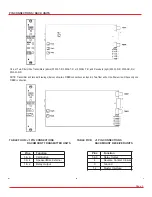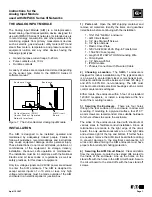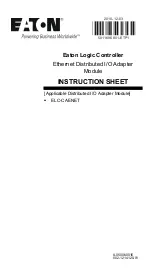
GENERAL
Units in this series are designed
specifically for use in interfacing to
remotely located speaker/mics of
intercom systems. A complete sys-
tem consists of a pair of transceivers
for connection to master and remote
intercoms. Since transceivers have
dedicated transmit and receive func-
tions,
they are referred herein to as
transmitters
and
receivers.
All func-
tions of the intercom systems to
which the links are interfaced, e.g.,
push-to-call, push-to-talk, call, and
hands-free operation, are transparent
through the interface units.
Units are available with several vari-
ables which include choices between:
• Modular or rack mounting.
• Interfacing to intercom systems
manufactured by Aiphone, Bogen,
Dukane, or Rauland.
User preferences were indicated at
the time of order and the units that
have been shipped with this instruc-
tion sheet include the features that
were specified.
ABOUT THE SYSTEM
Transmitters interface to remote
intercom units, both transmitting
and
receiving
audio signals. Receivers
interface to master intercom units,
both receiving
and transmitting
audio
signals.
The 350A2 and 350A2L models
operate over two fibers; the 350A1
model operates over a single fiber.
Modular (can) units may be used
as standalone units, placed in any
location that is convenient to the
remote or master intercom unit with
which they interface. Rack-mounted
units may be installed in a card cage
for use in any standard 19-inch rack,
each unit occupying one rack slot.
Modular units are powered by 12
VAC @ 20~25 mA, +14~16 VDC @
500 mA, or 120 VAC when using the
611P AC adapter (available from
Fiber Options).
Rack units are pow-
ered simply by plugging them into the
card cage.
ADJUSTMENT POTENTIOMETERS
Adjustment potentiometers are pro-
vided on both transmitters and
receivers. These potentiometers per-
mit user adjustment of audio to meet
individual requirements
Transmitters include the following
adjustment pots:
Rack or Can*
Function
R17
Automatic gain
control circuitry
(factory set)
R40
VOX
R42 SPKR
VOL.
R52
NOISE FLOOR (or
mike sensitivity).
*NOTE: Can adjustment pots are
internal.
Receivers include:
Rack Can* Function
R25
R21 Audio INPUT
LEVEL
R26
R23 Audio
OUTPUT
LEVEL
*NOTE: Can adjustment pots are
internal.
POT ALIGNMENT—FOUR STEPS
ONE: While speaking into the
master intercom mike, adjust the
receiver pot (on front bezel of rack
receIver unit, labelled INPUT
LEVEL) until an optimum audio-input
level has been achieved. While
adjusting, observe the audio-level
indicator LED which should illumi-
nate green in response to normal
speech. Refer to the paragraph
opposite for a description of indica-
tor LED functions.
TWO: Adjust the transmitter pot
(on front bezel of racked transmitter
unit, labelled SPKR VOL) until the
desired volume from the remote-
intercom speaker has been
achieved. Adjust the transmitter pot
(labelled VOX) to obtain the best
balance (compromise) between
amount of speech being cut out and
the speed with which it is possible to
return to LISTEN mode at the
remote location.
THREE: While speaking into the
remote intercom speaker, adjust
transmitter pot (labelled NOISE
FLOOR) until an optimum audio-input
level has been achieved. As before,
while adjusting, observe the audio-
level indicator LED.
FOUR: Adjust receiver pot (labelled
OUTPUT LEVEL) till the desired
audio-output level from the master
intercom has been achieved.
CAUTION: Do not adjust R17. It is
shown for location purposes only. It
has been factory set for the optimum
AGC function, and has no function
when adjusting audio levels.
THE OPTICAL INDICATORS
All units, modular or rack, have
have audio-level status and Level/
Loss indicators.
Audio-level status LEDs glow in
varying intensities of green as long
80 Orville Drive, Suite 102, Bohemia, New York 11716-2533 USA •631-567-8320 or 1-800-342-3748 • FAX 631-567-8322
Unit 7, Cliffe Park, Bruntcliffe Road, Morley, Leeds, West Yorkshire, LS27 0LQ, UK • 44-113-238-1668 • FAX 44-113-253-8121
Internet http://www.fiberoptions.com E-mail [email protected]
GE Interlogix
Fiber Options
MODEL 350A INTERCOM INTERFACE
INSTRUCTION
MANUAL






















